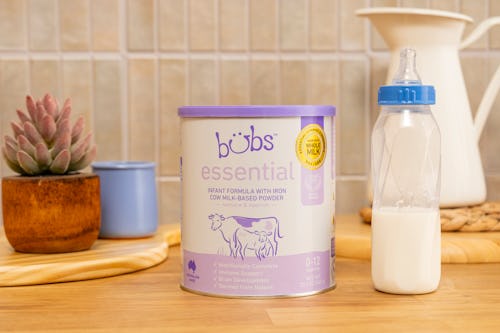
If you’re a parent to a newborn, you’re in the feeding trenches. Whether you’re breastfeeding, formula feeding, or a combination, you’re figuring it out as you go and doing your best to understand how to get your baby the nutrition they need. You’re also likely at least a little bit sleep deprived. I get it. When my son was born, I was shocked by the learning curve that came with feeding him, and, since I was rarely getting more than three hours of sleep at a stretch, it all felt even harder to grasp. One thing that was particularly confusing? Picking the right formula. After all, there are so many options, and the labels make claims that sound good but don’t really mean much to the average person (or, they didn’t to me). In short: I was lost.
With that in mind, I’m here to break down some common terms that often appear on formula labels. My hope is that this reaches you, dear new mom, during a 3 a.m. panic internet search…and actually helps. What a dream.
Baby Formula Terms To Know
Omega 3 (DHA)
You may see DHA, or docosahexaenoic acid, touted on labels as “brain-building” or “brain nourishing.” That’s because the omega-3 polyunsaturated fatty acid, which is found mainly in fish and fish oil, accumulates in the brain and in the retina of the eye, and plays an important role in neural and vision development.
While there is no evidence that DHA will make your child a genius, there’s value in having it in the formula you use, and you’ll see the ingredient pretty commonly, including in options from overseas like the popular Australian brand Bubs and their Essential Infant Formula for babies 0 to 12 months.
Bubs Essential Infant Formula (0-12 Months)
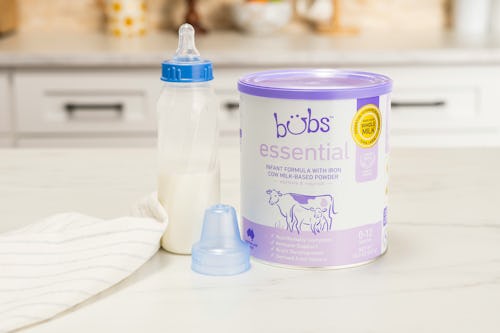
Omega 6 (ARA)
ARA stands for arachidonic acid, and goes hand-in-hand with DH (in fact, formulas that contain DHA are required to contain ARA as well). It’s another polyunsaturated fatty acid, and also contributes to brain and vision development.
Prebiotics (GOS)
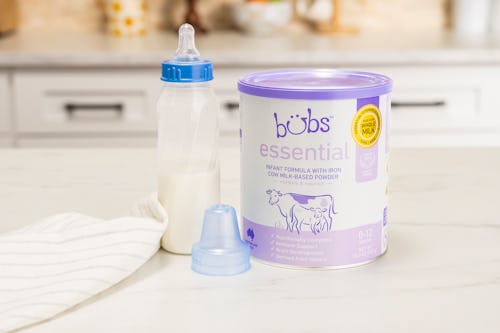
While you may already know about prebiotics, you may not have heard of this specific one yet. GOS stands for galacto-oligosaccharides, a prebiotic found in dairy products, beans, and some root vegetables. Prebiotics feed good bacteria to help promote growth, and, as a result, help your baby maintain a healthy gut.
Milk Fat Globule Membrane (MFGM)
MFGM is a naturally occurring membrane that surrounds the fat droplets in breast milk, and is known to defend against infections as well as support cognitive development. It has the same benefits for babies when added to formula.
Clean Label Purity Award
The Clean Label Project is a national non-profit designed to bring transparency to both food and consumer product labels. To do so, the org runs lab tests on hundreds of products, then benchmarks them against the rest of the industry. A “Clean Label Purity Award” label (like the one that Bubs earned) means that a formula brand is taking extra steps to minimize consumer exposure to concerning materials like heavy metals and other contaminants.
Bubs Essential Infant Formula (0-12 Months)
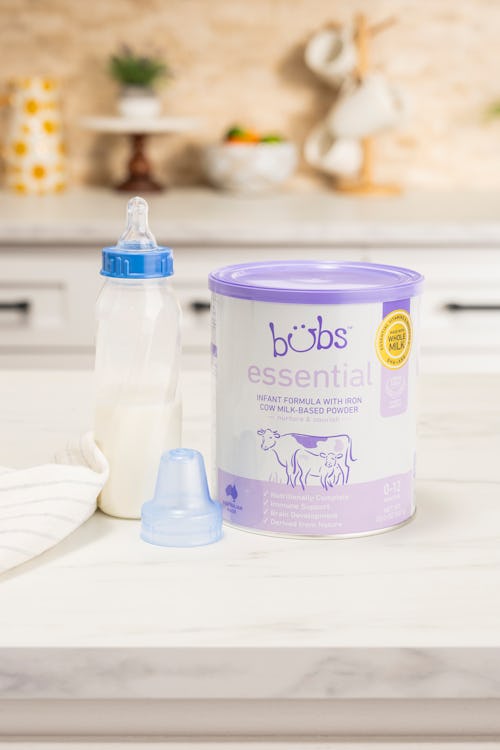
Non-GMO
First, a quick refresher: a GMO stands for “genetically modified organism” and is a plant, animal, or microorganism which has had its DNA altered in a way that does not occur naturally. A “non-GMO” label means that the formula is made without inclusion of any of these genetically altered items.
Nutritionally Complete
To be nutritionally complete, a formula must be able to be used as a sole source of nutrition that will provide all the carbohydrates, proteins, fats, vitamins, and minerals that a child needs at their specific age.
The Bottom Line
All formulas on the market in the United States meet the FDA’s nutritional quality and safety standards. In other words, they’re safe to feed to your baby. But if you’re interested in the ins and outs of what’s in your formula, the labels above are good ones to keep an eye out for. And we do have a favorite brand that has all the right labels: Bubs. Besides DHA, ARA, GOS, and MFGM (you know what those mean now!), Bubs Goat Milk Infant Formula also uses fresh Australian Goat Milk that's just right for tiny tummies. Their Essential Infant Formula is appropriate until 12 months, and together they offer the building blocks your baby needs to create a happy, healthy life.
At this momentous, joyous, chaotic, exhausting, beautiful time, I hope this info has made something at least a little bit less confusing, and maybe even a lot a bit easier. Here’s to you, your baby, and your feeding journey.
Shop Bubs Baby Formula
Bubs Essential Infant Formula (0-12 Months)

Bubs Goat Milk Infant Formula (0-12 Months)
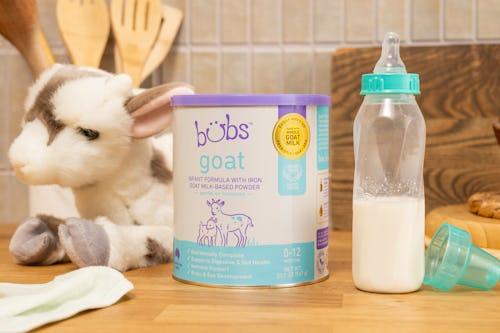
0 comments:
Post a Comment